“Every Christian community must realize that not only do the weak need the strong, but also that the strong cannot exist without the weak. The elimination of the weak is the death of fellowship.”
German theologian Deitrich Bonhoeffer

Experiencing participation and belonging in church usually require ongoing attention and prayer, throughout the life of our loved one with disability and family with extra needs.
There are barriers to being involved in church. This is true for everyone, no matter whether disability is involved or not. But there are typically more complex issues when a family or individual is facing things like disability, aging, medical issues, mental health conditions, or traumatic injury.
There are also tools to help you identify the needs, limitations, and opportunities for your loved one with disabilities or special needs and your family.
I personally understand that mustering the energy and vulnerability to initiate these conversations with our churches, sometimes even with our own family members, can be difficult. Unfortunately, many churches are simply not going to initiate this for us. (All the reasons that is true, wrong, tragic, unbiblical, disappointing, and even enraging are a post for another day.)
We simply must start with prayer for things like wisdom, kindness, creativity, and energy to initiate. And we must pray for our church. We can ask God to soften hearts, to open eyes to God’s heart on these matters, to stir willingness to have conversations, to guard the hearts of everyone involved from things like resentment and defensiveness, to open doors for ideas and opportunities, and to transform the entire leadership and congregation to be a stronger reflection of Christ.
Lord, help us all glorify You together!
Having consulted with hundreds of special needs families for 25 years, having learned from and alongside many of the most well-respected leaders and creators in the disability movement, and having lived this myself, I know that doing these things will help:
- Pray.
- Have the conversations. Use tools, if necessary.
- Repeat conversations seasonally, and if circumstances change (e.g., new diagnosis, hospitalization, job loss, moving, divorce, death).
Tools for Exploring Needs & Opportunities
SWOT Analysis
This is a familiar business tool that helps individuals and organizations explore strengths, weaknesses, opportunities and threats.
In my private meetings with family caregivers, discussions with church leaders, and presentations at conferences, I contextualize the SWOT tool focusing in four key areas where individuals and families need to engage but face barriers:
- Gospel Access
- Practical Helps
- Friendship and Discipleship
- Partnership in the Gospel (co-laboring)
This contextualized SWOT approach is a terrific format for exploratory discussion as parents and family, as well as with your church. Churches can also utilize a tool like this to initiate conversations and explore opportunities with the families they serve.
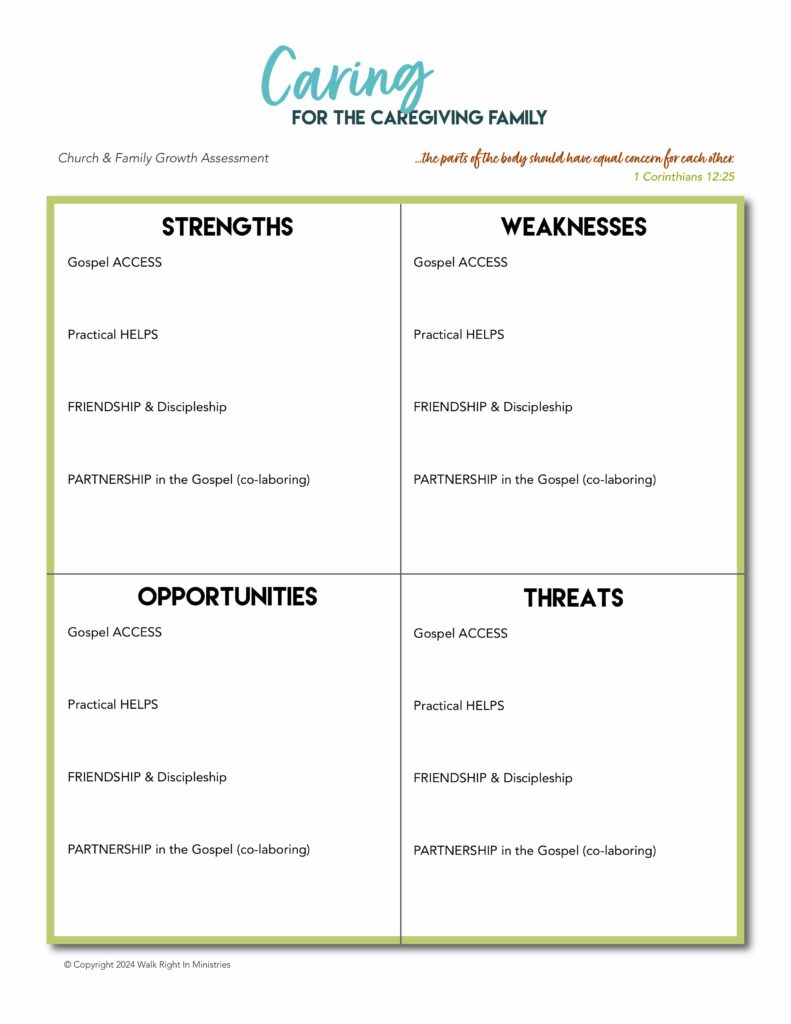
The illustrations below aim to demonstrate how you could use the SWOT tool to develop personal awareness and understanding. I have provided a sample representing a family with a younger child as well as a personal example (examples from the experience of a caregiving family with an adult loved one who has disabilities).
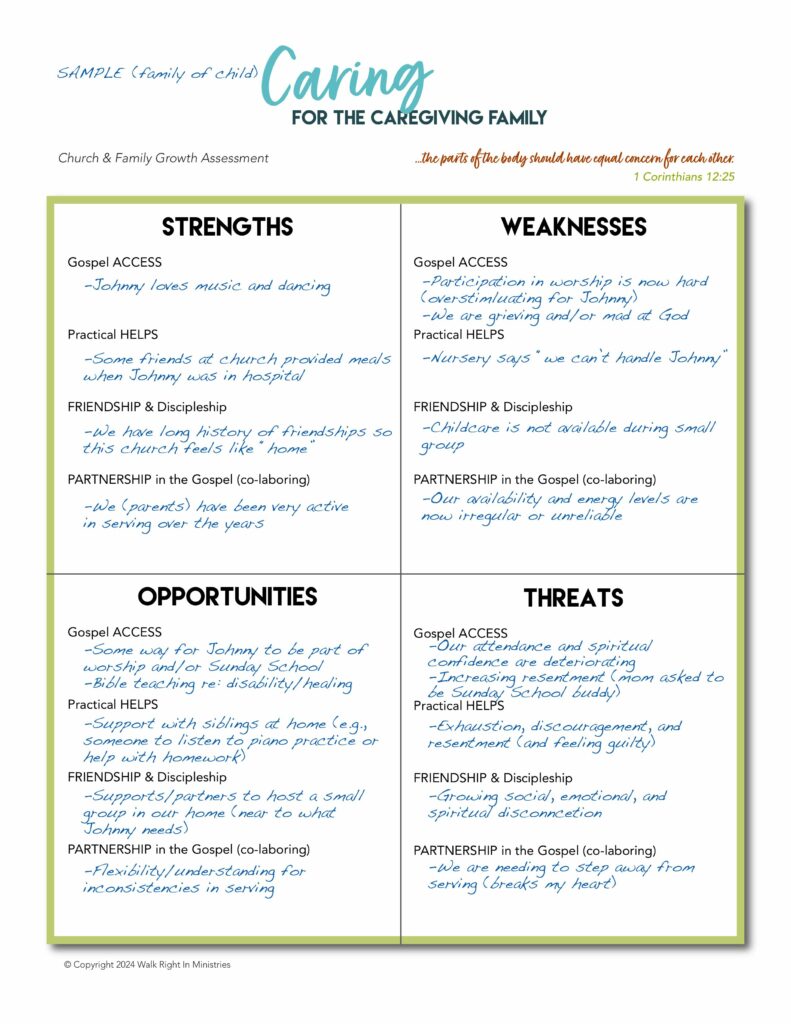
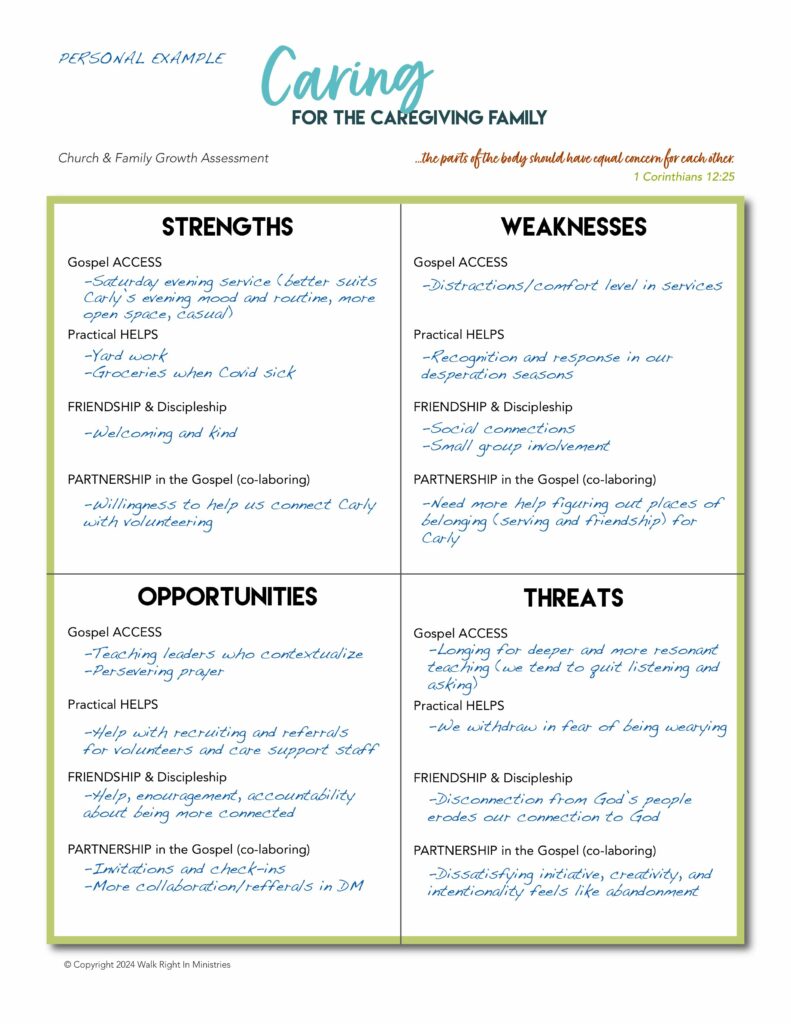
Can I encourage you to resist copying from the samples? Start with a clean slate (download the tool here) and ask God to show you what is true and vulnerable for you and your loved one.
ISP
Individual Spiritual Plans (ISP) are a wonderful aid to churches doing special needs ministry and wanting to communicate the gospel to every person in a way they understand and environment where they feel comfortable. Sandra Peoples explains in a blog about ISPs, “similar to what the students have at school under their IEPs, our ISPs take into consideration their likes, dislikes, strengths, goals, and behaviors. We decide on the goals after we get to know the student and by talking to the parents about what goals they have while their child is with us at church. Please take a moment to read Sandra’s blog about creating ISPs.
Books
As you’re able, read and recommend to your church leaders resources such as Same Lake, Different Boat by Stephanie Hubach, Disability and the Church by Lamar Hardwick, and Mental Health and the Church by Dr. Stephen Grcevich.
Benefits for Your Family & the Church
Everyone benefits when families living with disability are fully engaged with their churches and when the church is loving them well. Like it or not, our churches will need our help with this.
In a general sense, you can help your church learn to help you better by painting a compelling picture for them about what the Bible says and the ways it will benefit everyone when we all do this better together. More specifically, we can communicate as clearly as possible about the strengths, weaknesses, opportunities, and threats we experience. Approaching conversations in this way can help everyone keep a positive, encouraging, practical, hopeful, and God-glorying focus.
Let’s review some benefits of our families and churches fully engaging in life together:
- Keeps isolated or marginalized people and families visible (on radar of church leadership and others).
- Elevates our sense of urgency about advancing the Gospel and spiritual care to those who are hurting.
- Fosters a learning culture.
- Spotlights certain needs and gives platform for stories that teach us.
- Opens the eyes of our hearts to the Sovereign goodness of God’s design.
- Enriches our perspective and fosters compassion by moving us closer to the exchange of ideas, perspectives, cultures, values, and reconciliation.
- Reminds us we are not the center of the story (provides a living demonstration of sacrificial love and servanthood).
- Helps us understand our role in the broader diversity and disability conversation.
- Enhances the teaching ministry with broadly relatable examples.
- Holds Christ-followers and congregations accountable to “seeking God’s kingdom first, and His righteousness.”
- Reminds Christians about their role in “mercy ministry” (spiritual, emotional, and practical supports).
- Gives opportunity for Christians to be present with those who are in the valley like Jesus was.
- Cultivates a “linking culture” — Lamar Hardwick describes this as “creating a system for long-term relationships and long-term care for the families and individuals that you want to help get rooted in your church.”
- Reminds us that humans experience weakness and sin, and churches are imperfect. We are ALL utterly reliant on Jesus.
RELATED: We’ve Got the Tools, Let’s Hold the Faith
As you absorb these tools and opportunities for your family, let me encourage you with two final thoughts: the first from God’s word, the second from my friend Lamar Hardwick.
The seed on the rocky soil represents those who hear the message and immediately receive it with joy. But since they don’t have deep roots, they don’t last long. They fall away as soon as they have problems or are persecuted for believing God’s word.
Matthew 13:20-21
“People will always remember how you made them feel.
This truth needs to be fiercely applied to the church’s efforts to enable the disability community to put down roots. Roots are about relationships — long-term, reciprocal relationships that hold people close to the church and hold the church accountable for providing real care.”
Lamar Hardwick, Disability and the Church
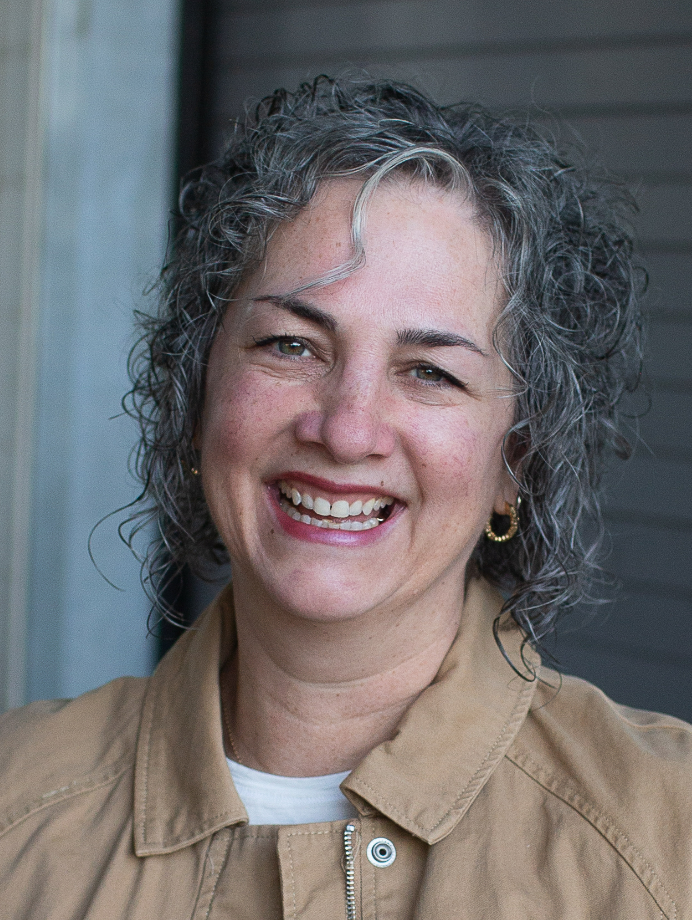
Lisa Jamieson is an author, speaker, special needs family advocate, and pastoral counselor. She is co-founder of Walk Right In Ministries where she trains and counsels family caregivers to walk abundantly in life, faith, and relationships. Lisa and her husband, Larry, live in Minnesota with the youngest of their three grown daughters, Carly, who has Angelman Syndrome.


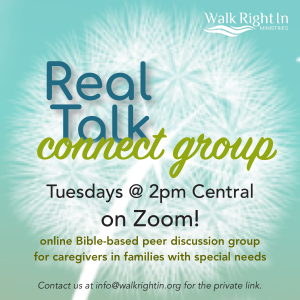
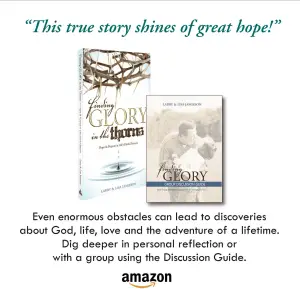
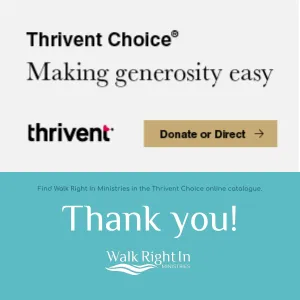
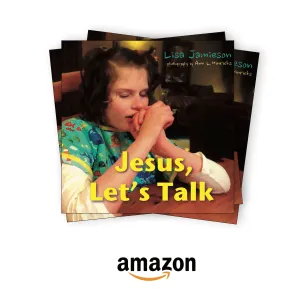

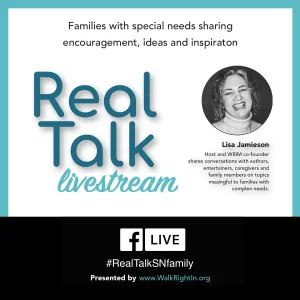
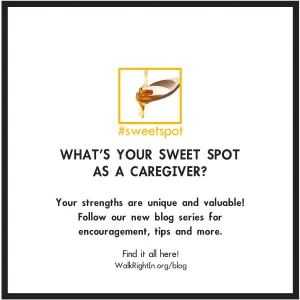

0 Comments